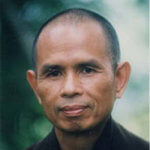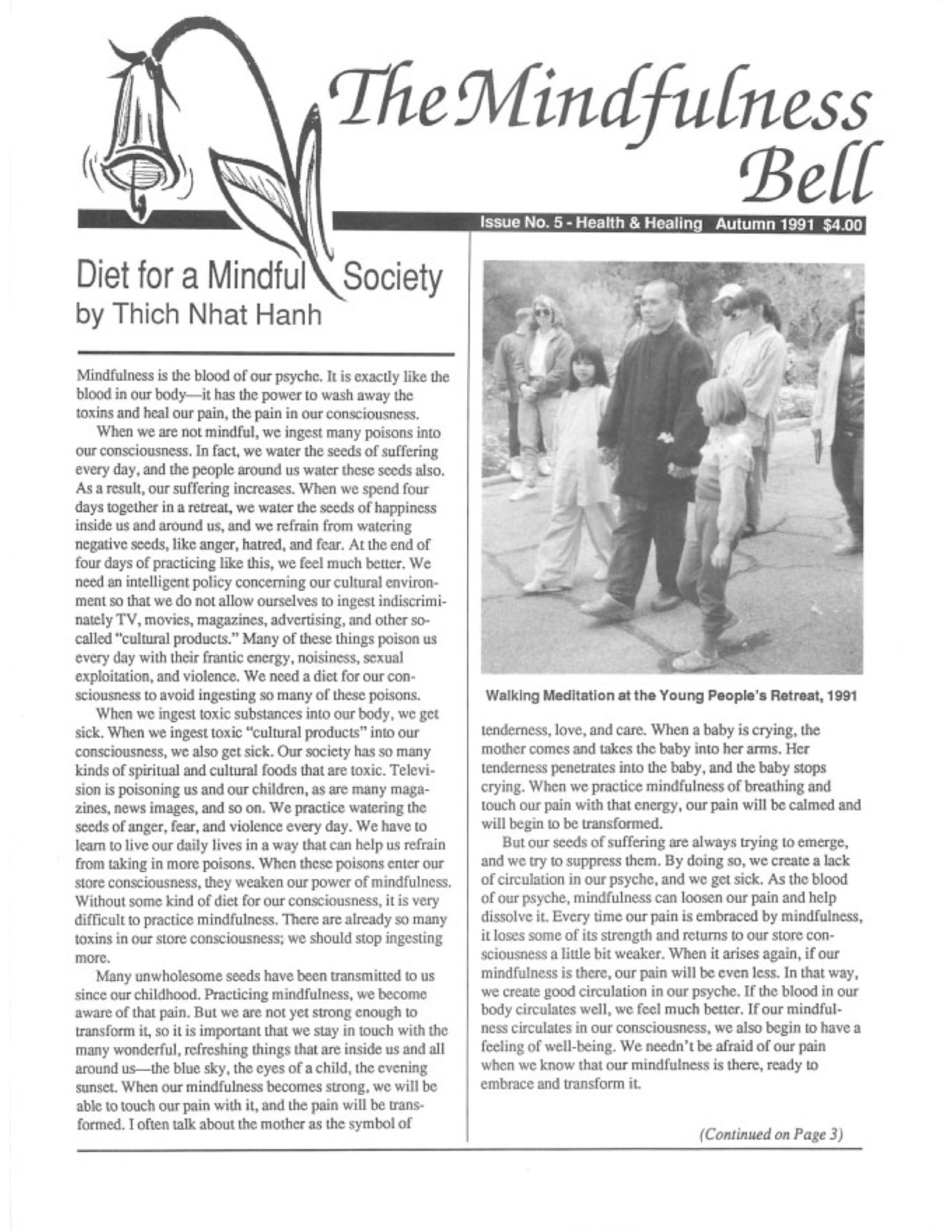By Thich Nhat Hanh in September 1991
Mindfulness is the blood of our psyche. It is exactly like the blood in our body—it has the power to wash away the toxins and heal our pain, the pain in our consciousness.
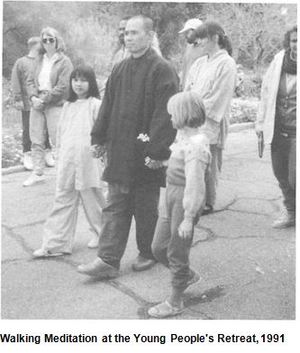
When we are not mindful, we ingest many poisons into our consciousness. In fact, we water the seeds of suffering every day, and the people around us water these seeds also.
By Thich Nhat Hanh in September 1991
Mindfulness is the blood of our psyche. It is exactly like the blood in our body—it has the power to wash away the toxins and heal our pain, the pain in our consciousness.

When we are not mindful, we ingest many poisons into our consciousness. In fact, we water the seeds of suffering every day, and the people around us water these seeds also. As a result, our suffering increases. When we spend four days together in a retreat, we water the seeds of happiness inside us and around us, and we refrain from watering negative seeds, like anger, hatred, and fear. At the end of four days of practicing like this, we feel much better. We need an intelligent policy concerning our cultural environment so that we do not allow ourselves to ingest indiscriminately TV, movies, magazines, advertising, and other so-called "cultural products." Many of these things poison us every day with their frantic energy, noisiness, sexual exploitation, and violence. We need a diet for our consciousness to avoid ingesting so many of these poisons.
When we ingest toxic substances into our body, we get sick. When we ingest toxic "cultural products" into our consciousness, we also get sick. Our society has so many kinds of spiritual and cultural foods that are toxic. Television is poisoning us and our children, as are many magazines, news images, and so on. We practice watering the seeds of anger, fear, and violence every day. We have to learn to live our daily lives in a way that can help us refrain from taking in more poisons. When these poisons enter our store consciousness, they weaken our power of mindfulness. Without some kind of diet for our consciousness, it is very difficult to practice mindfulness. There are already so many toxins in our store consciousness; we should stop ingesting more.
Many unwholesome seeds have been transmitted to us since our childhood. Practicing mindfulness, we become aware of that pain. But we are not yet strong enough to transform it, so it is important that we stay in touch with the many wonderful, refreshing things that are inside us and all around us—the blue sky, the eyes of a child, the evening sunset. When our mindfulness becomes strong, we will be able to touch our pain with it, and the pain will be transformed. I often talk about the mother as the symbol of tenderness, love, and care. When a baby is crying, the mother comes and takes the baby into her arms. Her tenderness penetrates into the baby, and the baby stops crying. When we practice mindfulness of breathing and touch our pain with that energy, our pain will be calmed and will begin to be transformed.
But our seeds of suffering are always trying to emerge, and we try to suppress them. By doing so, we create a lack of circulation in our psyche, and we get sick. As the blood of our psyche, mindfulness can loosen our pain and help dissolve it. Every time our pain is embraced by mindfulness, it loses some of its strength and returns to our store consciousness a little bit weaker. When it arises again, if our mindfulness is there, our pain will be even less. In that way, we create good circulation in our psyche. If the blood in our body circulates well, we feel much better. If our mindfulness circulates in our consciousness, we also begin to have a feeling of well-being. We needn't be afraid of our pain when we know that our mindfulness is there, ready to embrace and transform it.
If we have not been practicing for some time, our mindfulness may be of poor quality. It may only be a fifteen-watt light bulb. But if we practice for a few weeks, it will become a one-hundred-watt bulb. For mindfulness to be of good quality, conscious breathing should be practiced. Conscious breathing is the kind of fuel that can keep the light of mindfulness alive. If you practice five minutes of conscious breathing, you will keep mindfulness alive for five minutes. When contemplating a beautiful tree, if you stay in touch with your breathing for five minutes, you will also stay in touch with the tree for five minutes. If you lose awareness of your breathing, thinking may settle in, and the tree will vanish. Breathing is a wonderful way to sustain the seed of mindfulness in your consciousness.
In Asia, since early times, we have known that there is no boundary between food and medicine. When we eat and breathe properly, we nourish our blood. Our blood has the power to rinse away the toxins in our body and heal our pain. If we have good circulation, we will have a feeling of peace and joy, because the blood can go anywhere in our body and wash away the debris eliminated by our cells. We know that if we ingest a lot of toxic food into our intestines, our blood will receive many of these toxins and its power of cleansing and healing will be diminished. So we need to practice a kind of diet to help our blood stay clean.
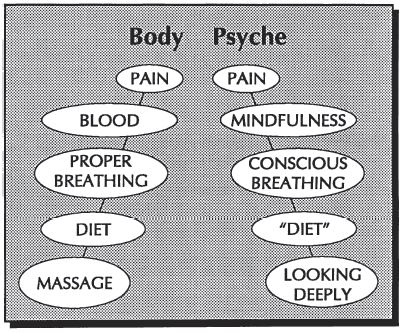
Following a diet does not mean to suffer. There are many delicious foods that have great nutritional value. And we don't have to eat a lot. Sometimes, when we are too sad and don't know what to do, we take refuge in eating. One woman who came to Plum Village told me, "Thay, every time I feel anxious, I just open the refrigerator door and eat. I cannot control myself." By taking refuge in eating, we stuff a lot of poisons into our stomach that we know are not good for our blood. Sometimes we also take refuge in studying, social work, protecting the environment, or watching television. We have many refuges that we use in order to run away from ourselves, from our own unhappiness.
We should select the things we eat carefully, and chew our food very well, at least fifty times. If you do so, after eating just half the usual quantity, you will feel satisfied. And chewing every mouthful carefully and slowly, your food will reveal itself to you, and it will already be partially digested by your saliva even before it enters your digestive system. Its passage will not be slowed down, and putrefaction will not take place in your intestines. Eating in this way prevents poisons from entering your blood.
Massage is also very important. When there is a spot in the body where the blood cannot circulate freely, we feel some pain. The oxygen in the blood isn't able to go there and flush out the toxins. Massage is a technique to revitalize circulation. If I practice massage on the spot that is sore, fresh blood will come there to nourish the cells and create a feeling of peace and joy in that spot. For healing to take place, we need the blood to circulate into the zone of pain. Blood is the agent of healing.
We know that to improve the quality of our blood, breathing is important. Our lungs have a three-and-a-half-quart capacity, but usually we breathe in and out only one-tenth of a quart. And if we don't breathe good air, the amount of oxygen we take in will be even less, and the quality of our blood will be poor. Therefore, we practice breathing in and out consciously, and as our breathing becomes deeper, we exhale more carbon dioxide and inhale more fresh, clean air. We have to learn to breathe more deeply, from our abdomen, and to breathe air that is of good quality. Diet, massage, and conscious breathing improve the quality of our blood. They also increase the quality of our mindfulness.
Please write down three things: First, what kind of toxins do you already have in your body, and what kind of toxins do you already have in your psyche? "Breathing in and breathing out, I recognize that these toxins are already in my body." What kind of toxins do you have in your consciousness? A guilt complex is a toxin, anger is a toxin, despair is a toxin, jealousy is a toxin. If you need to practice walking meditation or sitting meditation in order to look, please do so. Look and see for yourself what kind of toxins you have in your body, and what kind of toxins you have in your mind. What makes you suffer now? What blocks of suffering do you have right now? When you have done that, you will know what you have in your body and in your consciousness. Then, please go further, and look into the bodies and souls of your children and your spouse, since all of you are practicing together as a sangha. (Practicing as a community or a family is always easier. Not only will you refrain from watering the seeds of your own suffering, but your spouse and children will also practice not watering the seeds of your irritation, anger, and so on. That is why we take refuge in the sangha, the community that practices together.) When you recognize these toxins and list them on a sheet of paper, that is also meditation—looking deeply, recognizing, and calling things by their true names.
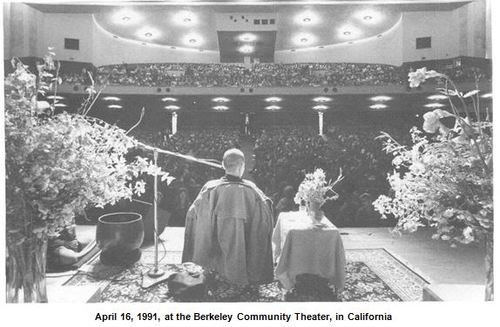
After that we come to Item Two: "What kind of poisons am I putting into my body and my consciousness every day?" We do this as individuals, as a family, as a city, and as a nation. We need administrators, legislators, and politicians to practice with us. If you are a psychotherapist, a writer, an artist, a filmmaker, a lawyer, a businessperson, or a social worker, you have to practice in this way for all of us. What am I ingesting every day that is toxic to my body and my consciousness? What is my family ingesting? What are my city and my nation ingesting every day concerning violence, hatred, and fear? The beating of Rodney King, the young driver in Los Angeles, by the five policemen is a good example of how much hatred, fear, and violence are in our society. What kinds of poisons do we ingest every day in our families, our city, and our nation? This is a collective meditation. We need everyone to participate.
Third, write down the prescription that arises out of that insight. For example, "I vow from today on not to ingest more of this, this, and this. I vow only to use this, this, and this to nourish my body and my consciousness." This is the ground of the practice—the practice of loving kindness to yourself. You cannot love someone else unless you love and take care of yourself. Practicing in this way is to practice love, peace, and enlightenment. Enlightenment is insight. When you look deeply, you have insight, and your insight brings about compassion. Before you begin to eat, breathe in and out and look at the table to see what is good for your body and what is not. This is to practice the precept of protecting your body. When you want to watch television or go to the movies, first look deeply in order to determine what should be viewed and what should not be viewed by you and your children. Think about the books and magazines you read, and decide what should be read and what should not be read by you and your children. Practicing together as a community, we don't need to take refuge in eating or entertaining ourselves with any more poisons. Practicing the precepts in this way helps all of us. Buddhist precepts are not imposed from the outside. From our own insight, we decide what to ingest and what not to ingest into our body and our soul.
For example, if all of us practice looking deeply into war, we will see into the true nature of our society and we will know what to do and how to live in order to prevent the next war. If we prescribe a healthy diet to ourselves, our families, our cities, and our nation and practice that kind of diet, another war will not take place. If we do not practice, a war like the Persian Gulf War will happen again in one, two, or five years. If we continue to live forgetfully, we will be overwhelmed again when we have to confront such a war. The true nature of war and the true nature of our collective consciousness are the same. For war not to come, we need to begin now to prevent it. The best way to prevent a war is to change our collective consciousness. As long as people believe that the war in the Persian Gulf was a war of liberation, a clean and just war, they will be tempted to do it again as soon as there is another conflict somewhere in the world. To change that kind of mentality, we have to practice looking deeply in order to understand the true nature of the war, which was not liberation, moral, or clean. If we don't practice mindfulness, the amount of hatred, illusion, anger, and violence in our society will lead our leaders to adopt such means again. Without an intelligent diet, we cannot reduce the amount of delusion, hatred, and violence in our society. When we practice well, we will stop bringing poisons into our blood, our soul, and our society.
Insight meditation, looking deeply, is a practice of massage. You practice in order to push the energy of mindfulness into your pain. As it penetrates more and more deeply, your pain will dissolve. I offer you an example: There are those who do not get along with their father (or their mother), because their father has made them so unhappy, has created in their store consciousness so many seeds of unhappiness that they don't want to look at him, they don't want to hear his name. They may have been abused as children. For these people I offer the meditation on the five-year-old child, which is a mindfulness massage. "Breathing in, I see myself as a five-year-old child. Breathing out, I smile to the five-year-old child in me." During the meditation you try to see yourself as a five-year-old child. If you can look deeply at that child, you can see that he or she is so vulnerable and fragile, can be hurt easily by anything that is not kind, can be wounded very easily. A stern look from his father can cause internal formations in his store consciousness. A shout from his father can cause another wound within his store consciousness. When his father makes his mother suffer, when his parents fight and scream at each other, the five-year-old receives a lot of seeds of suffering in him. I have heard young people say, "The most precious gift my parents can give is their own happiness." If parents live happily with each other, that is the greatest gift they can offer their children. This is true, and I hope all parents can understand it.
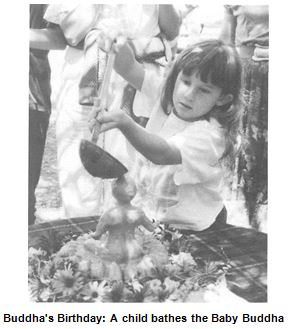
By living unhappily, by making his wife suffer, the father is making his son suffer a lot. He may have brutalized him so severely that the young man has not been able to smile or think of his father. But now he is sitting and visualizing himself as a five-year-old child, very vulnerable, easily hurt. When he smiles at that child, he smiles with compassion. "I was so young and tender, and I received so much pain."
The next day, I would advise him to practice this: "Breathing in, I see my father as a five-year-old child. Breathing out, I smile to that child with compassion." We are not used to seeing our father as a five-year-old child. We think of him as always being a big person, stern, with a lot of authority. But we have not taken the time to see our father as a tender, young boy who can be easily wounded by other people. The practice is to visualize your father as a five-year-old boy—fragile, vulnerable, easily hurt. If it helps, you can look in the family album to study the image of your father as a boy. When you are able to visualize him as vulnerable and easily hurt, you will realize that he too may have been the victim of his father. If he received many seeds of suffering from his father, of course he will not know how to treat his son well. So he makes you suffer, and the circle of samsara continues. Grandfather makes Father unhappy, Father makes Son unhappy, and so on. If you don't practice mindfulness, you will do exactly the same to your own children.
The moment you see your father as a victim of brutality, compassion will be born in your heart. When you smile to him with compassion, you will begin to bring blood into your pain. With mindfulness touching the pain, insight will also begin to touch your pain. If you practice like that for several hours or several days, your anger toward your father will dissolve. This is to massage the pain by way of mindfulness. It works in exactly the same way as the blood does in your body. One day, you will smile to your father in person and hug him, saying, "I understand you, Dad. You suffered very much during your childhood."
Therefore, mindfulness is the blood. Whatever it touches, it transforms. When it touches something beautiful, it makes it more beautiful. When it touches something painful, it begins the work of transformation.
Please discuss among yourselves a diet for your body, a diet for your consciousness, and also a diet for the collective consciousness of our society. This is the basic practice. It is true peace work. Peace begins with each of us taking care of our bodies and our minds every day.
Photos: First and third photo by Michele Hill. Second photo by Gaetano Maida
